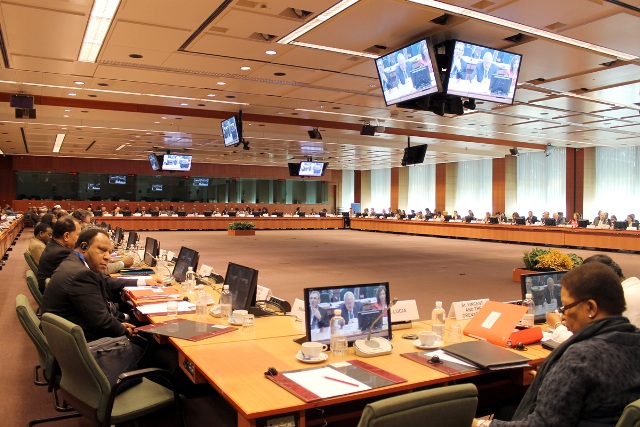 "The UK’s present trading relations with the African, Caribbean and Pacific (ACP) countries are tied in with the EU". [picture: ACP]
"The UK’s present trading relations with the African, Caribbean and Pacific (ACP) countries are tied in with the EU". [picture: ACP]
In the build-up to the referendum on whether the UK should remain in or leave the EU, much was made by the ‘Brexiters’, including Boris Johnson, David Davis, and Daniel Hannan, of the strong links to the Commonwealth and the potential future development of relations. As Peg Murray-Evans has argued, the Commonwealth ‘was cited as the basis for an ambitious agenda for a series of new British trade agreements following a vote to leave the EU’, and that by joining the EEC the UK ‘betrayed our relationships with the Commonwealth’. So what potential is there for the UK to deepen its links with the Commonwealth, of which 30 of its members are considered to be small states?
Trade is a potentially significant aspect of any deepening of relations. However, overall trade between the UK and the small states of the Commonwealth is limited. In 2015 it was only 6.5% of total UK–Commonwealth trade, and the trade balance continues to favour the UK. Botswana (54.4% of its total exports) is the largest exporter to the UK, selling mainly beef and diamonds. Other major exporters are Belize (22.0%), Seychelles (21.0%), Mauritius (13.4%) and St Lucia (10.8%). It has to be noted that there are other small countries whose trade share is insignificant, but for whom the UK is an important market. So despite the relatively limited trade the UK has with the small countries of the Commonwealth – and indeed the Commonwealth more generally – the UK remains an important trading partner. However, it is unlikely that the UK will become a much more significant trading partner in the future. Indeed, as the UK prioritises comprehensive trade deals with the EU, US, and larger Commonwealth countries such as Canada and Australia, negotiations might crowd out the interests and concerns of the smaller Commonwealth states. This would be particularly damaging as the UK’s present trading relations with the African, Caribbean and Pacific (ACP) countries are tied in with the EU. Indeed, once Brexit happens the UK will not have any formally agreed trade relations with these countries. Further, from the perspective of the small states of the Commonwealth, they will lose a useful intermediary with the EU, in the form of the UK. The EU will then have a much stronger Francophone and Lusophone edge, which may well have a negative impact on broader EU–ACP relations.
Remittances are a further issue of interest. The UK is a significant source of remittances globally, including to a number of Commonwealth countries, and remittances therefore represent one of the most significant economic linkages between the UK and the Commonwealth. Among the top 10 Commonwealth remittance recipients are four small states (Cyprus, Mauritius, Malta, and Barbados) and two least-developed countries (LDCs) (Uganda and Zambia). Notwithstanding, the literature and historical flows suggest that remittances are resilient and remittances are not that sensitive to economic cycles. This then suggests that remittances are driven by altruistic rather than economic motives. However, in the worst-case scenario, Brexit could result in tighter immigration controls which could then cause a reduction in remittances and possibly a permanently lower pound/US dollar exchange rate, further exacerbating the reduction.
A third issue is official development assistance (ODA). Small states receive a small amount of ODA directly from the UK, amounting to US$24 million in 2014. This still makes the UK the fourth largest bilateral donor following the US, Japan and Germany. But ODA to these countries through the UK’s contribution to the EU, and other multilateral institutions, is substantial. For instance, it is estimated that £1.4 billion is allocated each year to small developing states bilaterally and multilaterally, including via the EU. The question then arises, after Brexit will the UK continue to contribute this significant amount of aid? The UK, along with the majority of advanced countries, has committed to contributing 0.7% of its gross national income (GNI) as ODA. The UK is one of six countries to have met this target; in 2015 this commitment was enshrined into UK law, and the Conservative government and Labour opposition remain obligated to the 0.7% figure. However, there are downside risks reflected in the UK’s relatively poor growth forecasts that raise questions about its ability to meet such commitments. These concerns are worsened by the future loss of UK contributions to the EU and uncertainty around the economic impact of Brexit.
A final issue is debt. Small states are the most highly indebted in the Commonwealth, led by those in the Caribbean. The debt situation in the Caribbean is acute, with some debt-to-gross domestic product ratios close to, or above, 100%. It also coincides with a trajectory of relatively low growth, and these countries cannot afford large and unexpected shocks. The appreciation of indebted countries’ currencies against the UK pound is not likely to bring material gains because the majority of Caribbean countries have pegged their currencies to the US dollar. Further, World Bank Development Indicators show that in the Commonwealth, only 0.15% of external long-term public and publicly guaranteed debt is contracted in UK pounds. Thus, the prospects for exchange rate-induced debt relief are minimal.
So for the small states of the Commonwealth the link with the UK, within the context of the EU, is important in relation to both trade and aid. Therefore, it is unlikely that they will gain significant benefit from Brexit, but there are clear risks if the UK moves too far away from its current approach and does not put in place a new trade agreement with ACP countries and fails to maintain its overall level of development assistance.
Related articles:
The ACP, the Commonwealth and the challenge of Brexit
After Brexit: Securing ACP interests – a Ramphal Institute report



